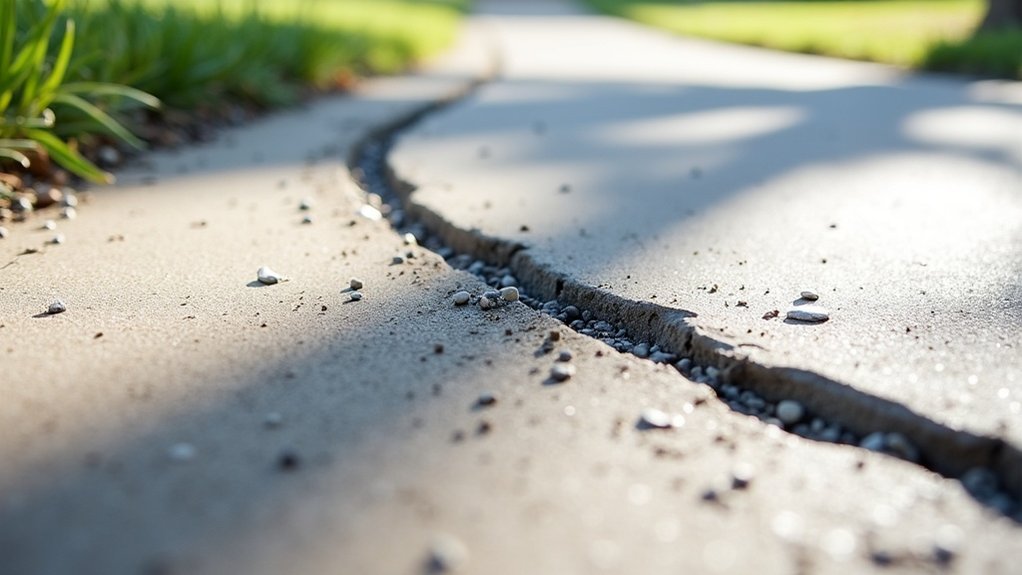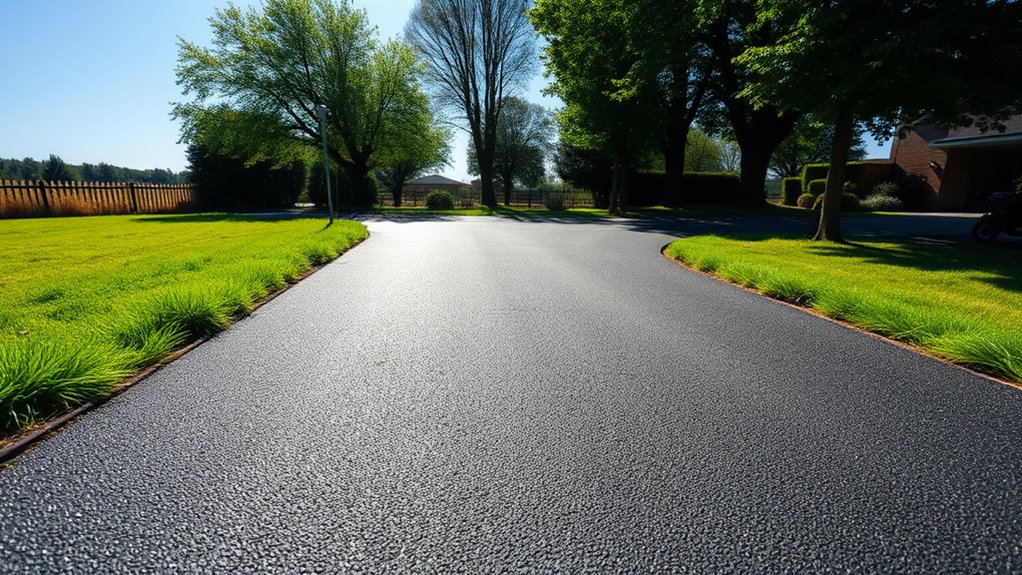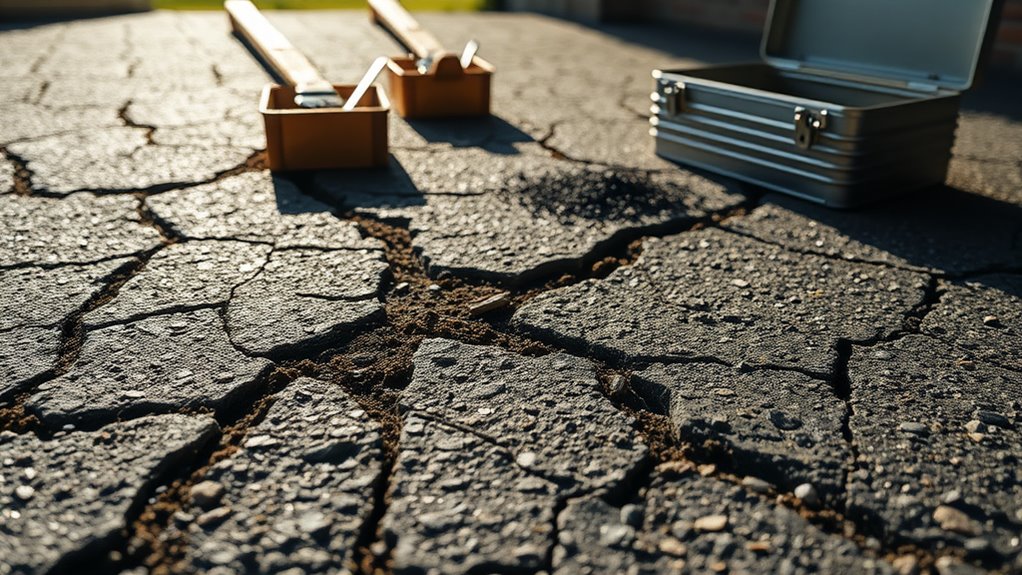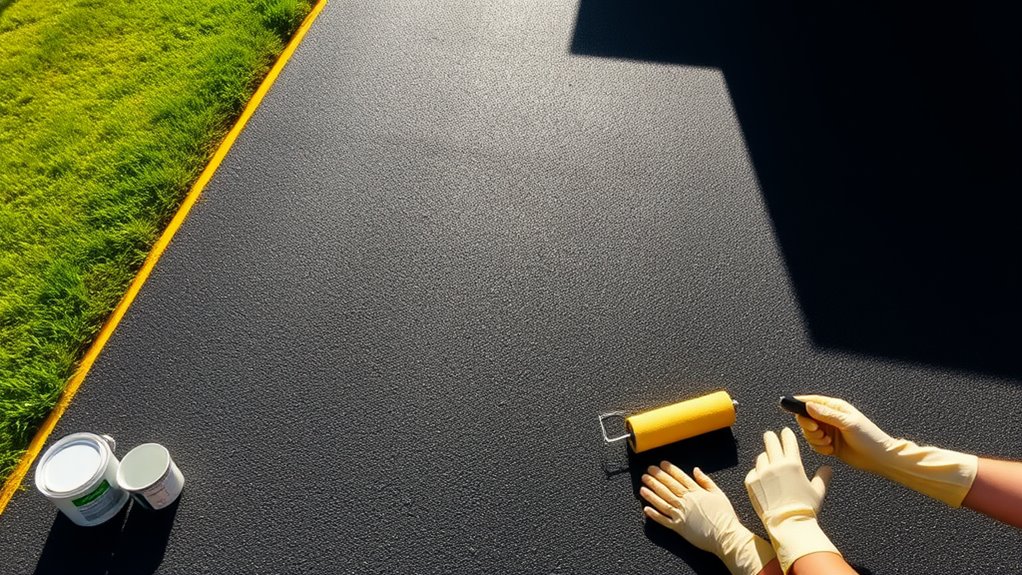For concrete driveways, consider using epoxy, polyurea, or silicone-based fillers. Epoxy provides strong adhesion and cures quickly, making it efficient for application. Polyurea offers excellent flexibility, allowing for movement in the slabs without tearing. Silicone fillers are highly durable, lasting up to 20 years and resisting water and UV damage. If you’re after a more budget-friendly option, vinyl or foam-based fillers can also be effective. Explore these choices to find the best solution for your driveway needs.
Table of Contents
ToggleKey Takeaways
- Polyurea Fillers are perfect for driveways as they cure quickly and offer excellent flexibility, which allows them to adapt to slab movement without cracking.
- Silicone-Based Fillers provide superb elasticity and waterproofing, making them ideal for driveways in damp conditions to stop water from seeping through.
- Epoxy Fillers deliver strong adhesion and resist chemicals, making them effective for securing joints and preventing bonding failures in driveways.
- Vinyl-Based Fillers are straightforward to apply and moderately flexible, suitable for outdoor use while offering decent chemical resistance for driveways.
- Foam-Based Fillers are lightweight and compressible, providing great durability and flexibility, making them suitable for various joint shapes in driveways.
Understanding Joint Fillers for Concrete Driveways
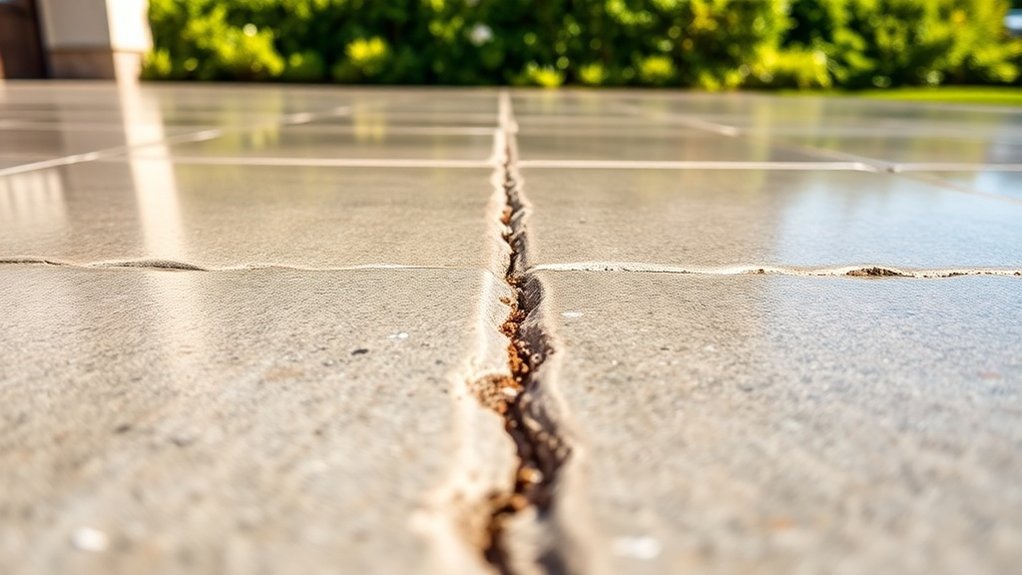
Understanding joint fillers for concrete driveways is crucial for ensuring their durability and longevity. There are several types of joint fillers, each with unique characteristics.
For instance, epoxy fillers provide strong adhesion but can be rigid and less flexible. In contrast, polyurea fillers cure quickly and are designed to handle temperature changes effectively. Silicone-based fillers stand out for their flexibility and resistance to moisture, making them suitable for harsh weather conditions. Additionally, selecting the right joint filler is important because it directly impacts the control joints‘ ability to manage temperature and moisture-induced shrinkage.
When it comes to application, epoxy fillers can be easily applied using manual guns, while polyurea fillers need specialised equipment due to their short working time. Silicone fillers usually require professional installation to achieve the best results.
The Benefits of Epoxy-Based Fillers
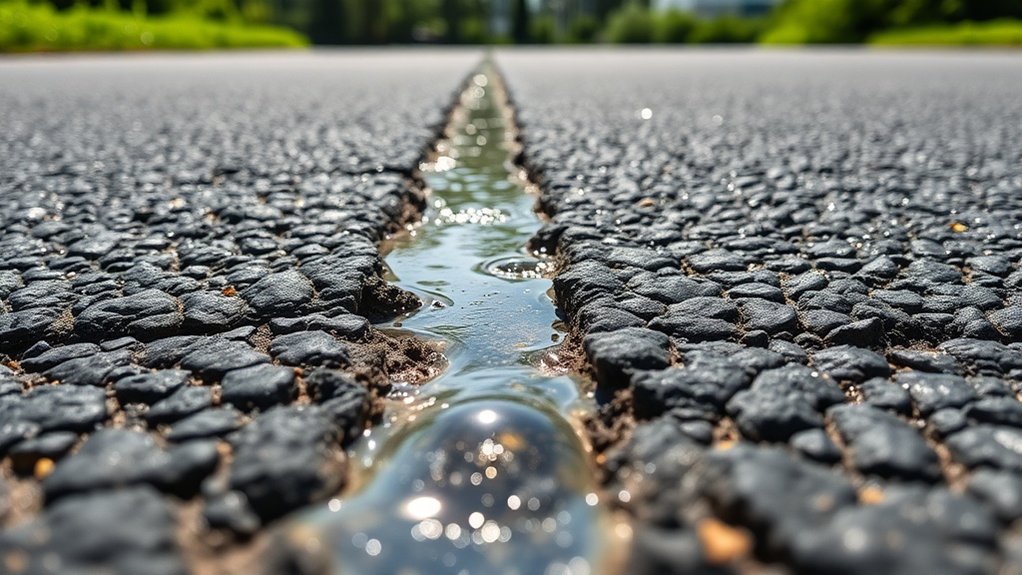
When you opt for epoxy-based fillers for your concrete driveway, you’re ensuring a strong bond that keeps joints secure. These fillers cure quickly, allowing for efficient application and reducing downtime. Their impressive durability means you’ll have a robust surface that can handle the UK’s weather and heavy use, making them a smart choice for any homeowner. Additionally, epoxy joint fillers provide excellent resistance against oils and chemicals, further enhancing their longevity and performance.
Superior Bond Strength
Epoxy-based fillers are renowned for their outstanding bond strength, making them an excellent choice for concrete driveways. One major advantage of epoxy is its ability to create a permanent bond with concrete, which is significantly stronger than alternatives like latex or polyurethane. This strong bond helps prevent issues such as adhesion failure and delamination, ensuring that joints remain intact over time. Furthermore, contraction joints effectively direct natural concrete cracks along predetermined lines, which helps in minimizing random cracking in concrete slabs. They can adhere well even in cold conditions, and their semi-rigid flexibility allows for slight expansions without losing strength.
Additionally, epoxy fillers are resistant to chemicals and environmental factors, offering long-lasting durability. This makes them a wise investment for the maintenance and longevity of your driveway.
Quick Curing Time
If you’re worried about the downtime from driveway repairs, epoxy-based joint fillers are a great solution with quick curing times.
These fillers can be applied easily and often set in just a few minutes, allowing light foot traffic within an hour. Some types even achieve functional curing in about four hours, so same-day use is possible.
Ideal conditions, like temperatures between 7°C and 32°C, help speed up the curing process. By minimising exposure to dirt and moisture, epoxy fillers protect the surface while allowing for a faster maintenance schedule.
This means you can carry out multiple repair stages in one day, keeping disruptions to a minimum for both homes and businesses.
Long-lasting Durability
While quick repairs might be your priority, the long-lasting durability of epoxy-based joint fillers is crucial for maintaining your concrete driveway’s integrity.
These fillers offer excellent adhesion, preventing separation in various weather conditions. Their flexibility accommodates temperature changes, and the waterproof seal protects against moisture.
- Prevent cracking by directing stress along control joints.
- Reduce maintenance by resisting dirt and debris build-up.
- Withstand heavy traffic without damaging the joint edges.
- Keep a seamless finish for aesthetic appeal.
With their resilience and strength, epoxy fillers outperform other options, ensuring your driveway remains both structurally sound and visually appealing over time.
Investing in epoxy-based fillers means fewer repairs and a longer-lasting driveway.
Exploring Polyurethane Sealants
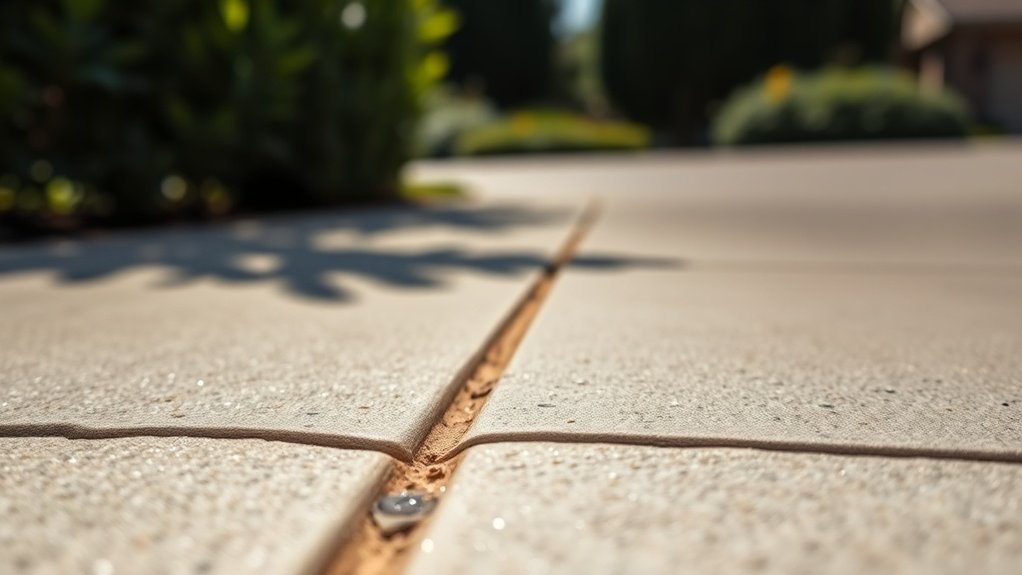
Polyurethane sealants are an excellent choice for protecting concrete driveways, thanks to their outstanding chemical and physical properties.
These sealants create a strong, protective layer that adheres to the concrete, boosting durability and reducing wear. They cure within the pores of the concrete, which helps to minimise dust and abrasion, while also offering impressive resistance to oil, petrol, and common household chemicals.
For the best results, proper surface preparation is crucial to ensure good adhesion.
Polyurethane sealants effectively repel moisture, helping to prevent cracking caused by freeze-thaw cycles. Additionally, they come in both glossy and matte finishes, allowing you to enhance the appearance of your driveway.
With their long-lasting performance, polyurethane sealants are a smart investment for any driveway.
Advantages of Silicone-Based Fillers
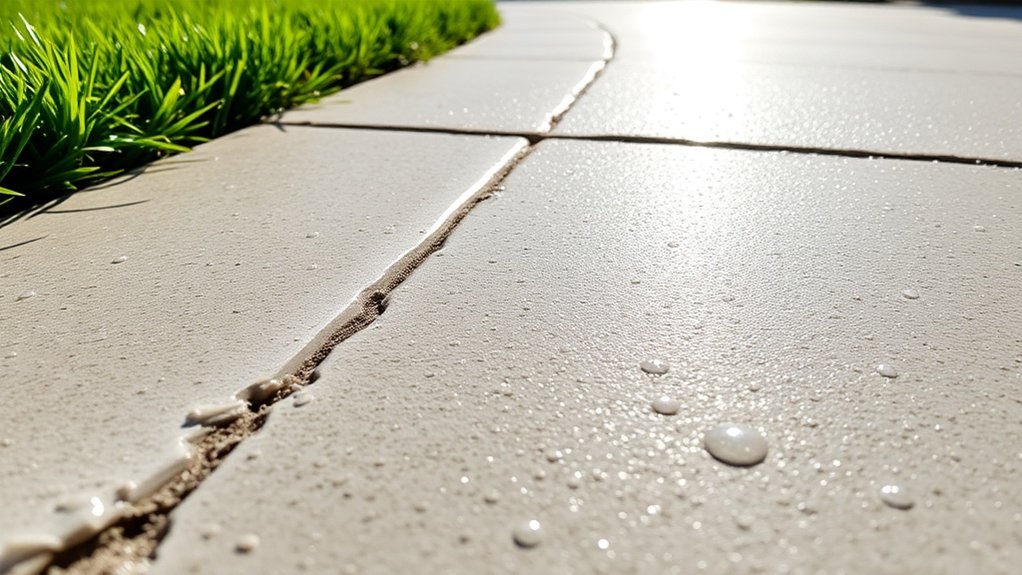
Silicone-based fillers provide excellent flexibility and durability, making them perfect for accommodating the natural expansion and contraction of concrete.
Their resistance to UV rays and severe weather ensures long-lasting performance without deterioration.
Exceptional Flexibility and Durability
When it comes to preserving concrete driveways, silicone-based joint fillers offer exceptional flexibility and durability.
These fillers are particularly effective in maintaining joint integrity, as they can adapt to substrate movement without cracking. Their high elasticity allows them to manage the expansion and contraction caused by temperature changes, thus preventing joint failure.
Key benefits include:
- Excellent elastic recovery, returning to their original shape after compression.
- Longevity of up to 20 years, outlasting many other options.
- Resistance to cracking, shrinking, and hardening over time.
- Improved performance under dynamic loads and environmental stresses.
Weather and UV Resistance
Many joint fillers struggle with exposure to the weather and UV rays, but silicone-based options stand out as a top choice for protecting concrete driveways. Their durability ensures they resist UV degradation, preventing issues like cracking, yellowing, or bubbling, even in intense sunlight.
Silicone fillers provide 100% waterproof sealing, stopping water from seeping in and accommodating temperature changes without failing.
In contrast to polyurethane fillers, silicone performs better in various weather conditions, lasting between 10 to 20 years and resisting mould and mildew growth. They cure quickly, making application fast, and they adhere well to different surfaces, ensuring a strong seal.
With their long-lasting stability, silicone fillers require minimal maintenance, making them an excellent choice for durable concrete driveway protection.
The Role of Polyurea Joint Fillers
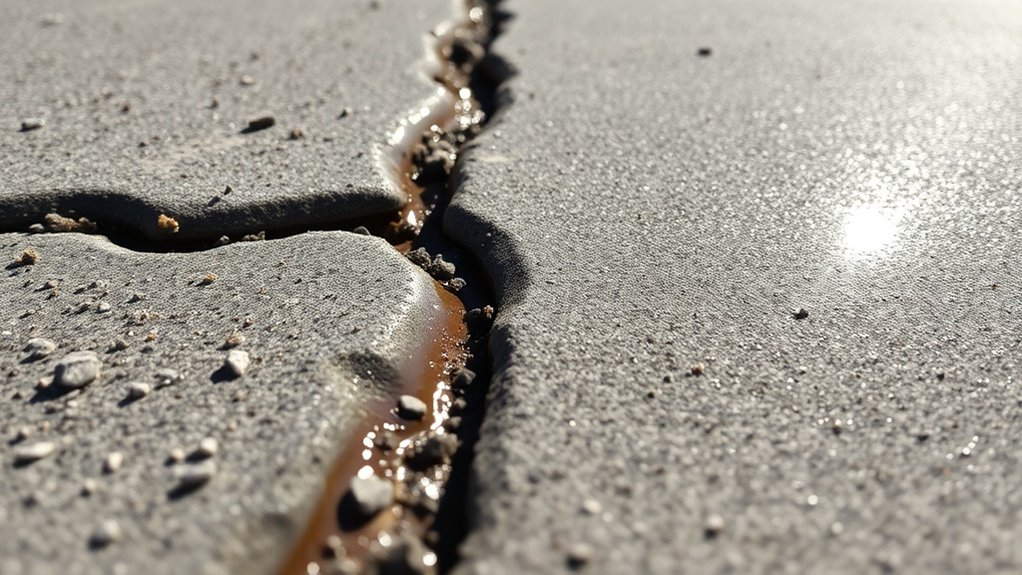
- Cures quickly, reaching a tack-free state in just 5–15 minutes.
- Offers excellent elongation and flexibility, resisting tearing caused by slab movement.
- Ensures full-depth filling to support joint edges and prevent spalling.
- Self-levelling application provides clean finishes without the need for extra tooling.
Vinyl-Based Fillers: A Cost-Effective Option
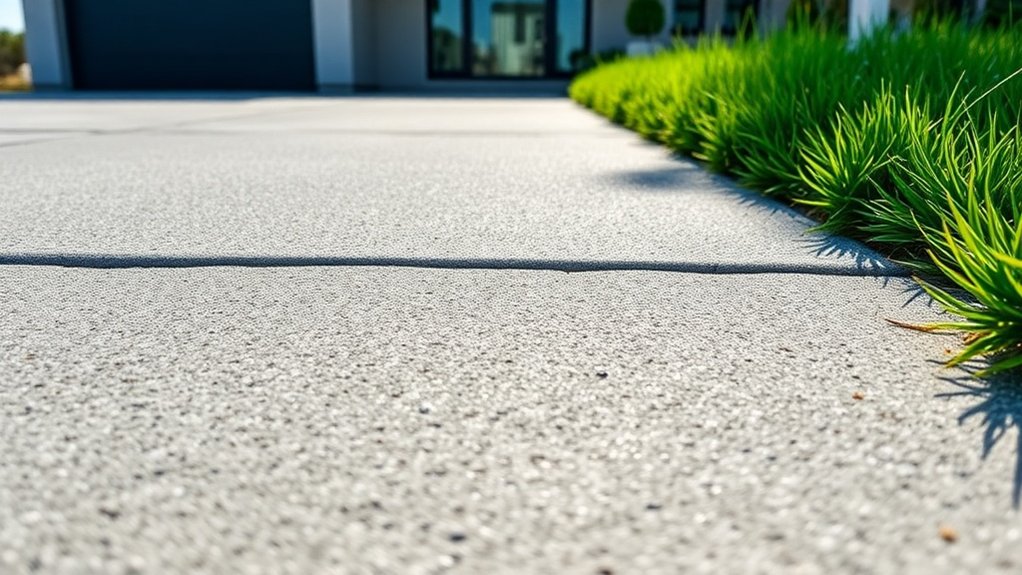
Polyurea joint fillers deliver excellent performance, but if you’re seeking a more cost-effective option, vinyl-based fillers could be the answer.
Made from flexible vinyl polymers, these fillers come in strips or rolls that can be easily pressed into existing joints, making installation straightforward. While they provide moderate flexibility, they may struggle with extreme temperature changes compared to other materials.
Their resistance to common chemicals and UV damage means they’re suitable for outdoor use. Plus, they require minimal surface preparation, allowing for quick application.
With a lifespan of 3 to 5 years, vinyl-based fillers offer a good balance of affordability and durability, making them a sensible choice for residential concrete driveways.
Foam-Based Fillers and Their Applications
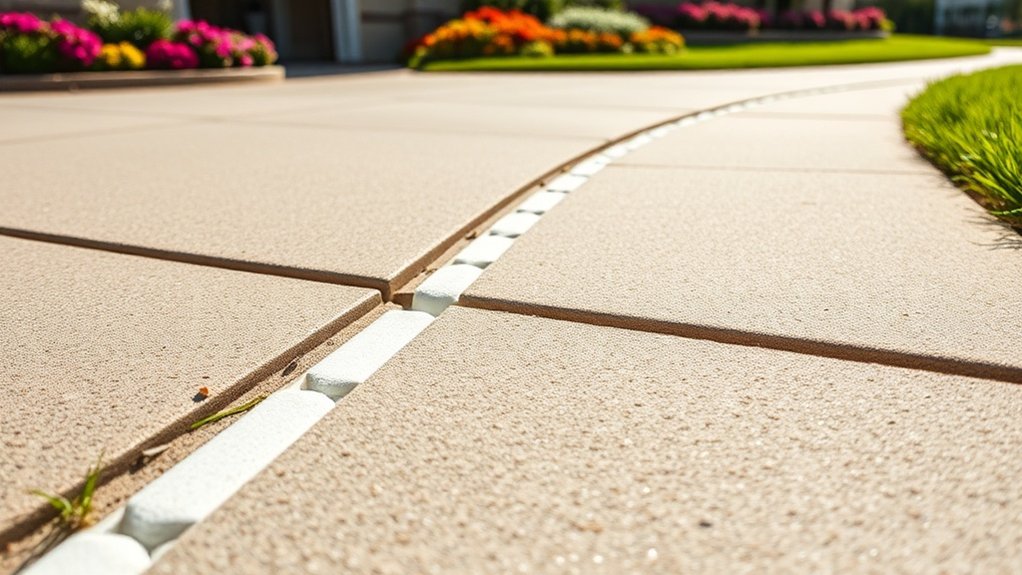
When choosing joint fillers for concrete driveways, foam-based fillers stand out as a versatile and effective option due to their unique properties. Typically made from closed-cell polypropylene or polyethylene foam, these fillers offer excellent durability and flexibility.
- They’re lightweight and compressible, allowing them to accommodate movements in the concrete.
- Their chemical resistance and non-absorbent nature help minimise freeze-thaw damage.
- Available in various thicknesses, they can meet specific joint requirements.
- They can be easily integrated with sealants to improve joint performance.
For proper installation, it’s crucial to secure the foam to existing slabs or formwork using tape or fasteners to maintain the joint’s shape.
This ensures optimal performance and longevity, making foam fillers a preferred choice for applications ranging from driveways to airport runways.
Key Considerations for Choosing Joint Fillers
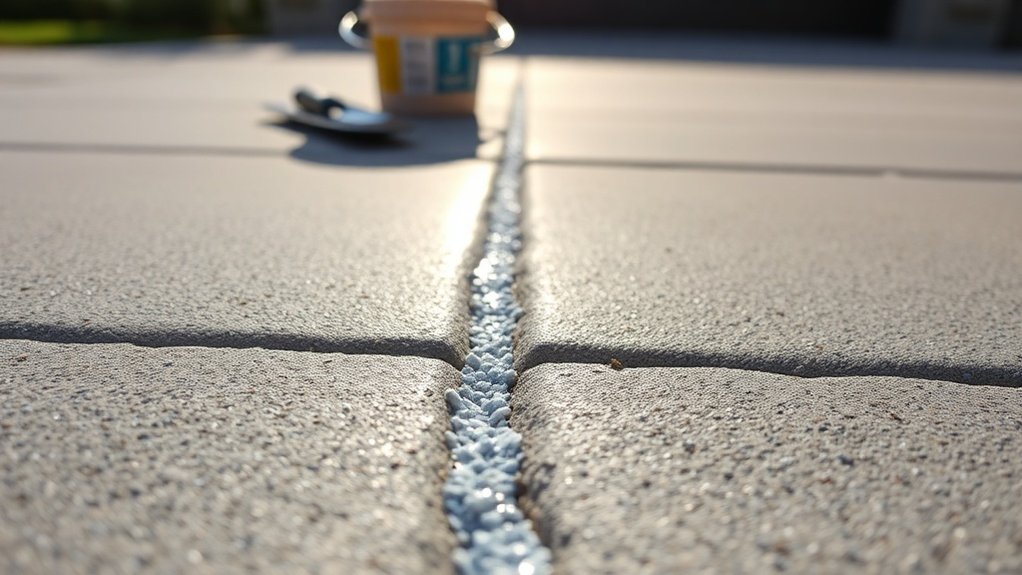
Choosing the right joint filler for concrete driveways involves some important factors that affect durability, flexibility, and resistance to the elements.
Start by considering the expected lifespan. High-quality silicone fillers can last between 10 to 20 years, while polyurethane fillers usually last around 5 to 7 years.
Flexibility is another key factor; silicone-based fillers are excellent for handling temperature fluctuations, whereas polyurea fillers manage moderate movement but aren’t as flexible.
Installation methods also matter. Polyurea fillers cure quickly and can be applied in cooler temperatures, which can help speed up your project.
Lastly, think about the environmental conditions—opt for moisture-resistant silicone in humid areas or UV-resistant polyurea fillers in sunnier climates.
Frequently Asked Questions
How Do I Prepare Concrete Joints Before Applying Fillers?
To prepare concrete joints for filler application, start by thoroughly cleaning out any debris. Ensure the joint dimensions are correct and create a rough surface to enhance adhesion. Use a backer rod to manage the depth of the filler, and make sure to keep moisture and contaminants away for the best results.
Can Joint Fillers Be Painted or Stained After Application?
Joint fillers typically cannot be painted or stained after application because they have non-porous surfaces. If you’re thinking about painting or staining, ensure you prepare the surface properly and check for compatibility with the filler to prevent adhesion issues. For example, using a primer designed for non-porous materials may help improve paint adherence.
What Is the Average Cost of Joint Fillers for Driveways?
The average cost of joint fillers for driveways in the UK depends on the type of filler and various cost factors. You can expect to pay between £2 and £10 per linear metre, with total costs typically ranging from £275 to over £1,000, depending on the size of the project.
How Long Do Joint Fillers Typically Last in Different Climates?
Joint fillers can be likened to seasoned soldiers; their lifespan is influenced by the climate. In humid regions, silicone fillers typically last between 10 to 20 years. However, in areas with extreme temperatures, rubberised fillers usually endure around 5 to 8 years. This variation highlights the importance of considering local weather conditions when choosing joint fillers.
Are There Any Safety Precautions When Using Joint Fillers?
When using joint fillers, always wear safety gear to protect against chemical exposure. Ensure good ventilation, avoid direct skin contact, and follow disposal guidelines to reduce risks from inhaling fumes or harming the environment. For example, wearing gloves and a mask can help keep you safe while working.
Conclusion
In conclusion, choosing the right joint filler for your concrete driveway is crucial for both durability and appearance. While the initial expense may seem daunting, opting for high-quality fillers like epoxy or polyurethane can save you money over time by reducing the need for repairs and maintenance. A good filler not only safeguards your driveway but also extends its lifespan, making it a sensible investment for any homeowner prioritising quality.
Maximize the durability of your tarmac driveway by understanding the ideal weather conditions for installation—discover the secrets to perfect timing Read more
Discover the common causes of tarmac driveway cracks and learn effective repair methods to protect your investment—your driveway deserves the Read more
Before you paint your tarmac driveway, discover essential tips and techniques that can transform its appearance and durability—don't miss out Read more

